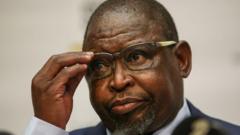Finance Minister Enoch Godongwana faces backlash as the planned budget presentation is deferred amidst tax hike proposals.
South Africa's Budget Unveiling Postponed Amid Coalition Disputes

South Africa's Budget Unveiling Postponed Amid Coalition Disputes
Unexpected disagreements within the coalition government lead to budget delays and market reactions.
South Africa's Finance Minister Enoch Godongwana has encountered a significant hurdle as the announcement of the national budget has been delayed due to sharp disagreements among coalition partners. The coalition, which includes the African National Congress (ANC) — Godongwana’s party, has been embroiled in debates regarding a proposed increase in value-added tax (VAT) from 15% to 17%. This proposed hike, aimed at addressing the country's revenue shortfall, faced strong opposition from partners like the Democratic Alliance (DA), which expressed concerns that such an increase would exacerbate the ongoing cost-of-living crisis facing South Africans.
The postponement is unprecedented since the end of apartheid in 1994 and has sent ripples through financial markets, resulting in a drop in the South African rand against the US dollar. DA leader John Stenhuisen stated that the party could not "in good conscience" support a budget that could potentially devastate economic growth, labeling the proposal a crisis in governance. Other coalition partners, including the Freedom Front Plus, indicated they were not adequately informed about the tax increase plans before it reached the public forum.
Godongwana clarified that he had mentioned the matter in a recent cabinet meeting, yet the failure to secure consensus led to the abrupt postponement of the budget, which is now set to be presented on March 12 following further negotiations. The Economic Freedom Fighters (EFF), an opposition party, criticized the delay, citing it as indicative of weak governance. However, the DA celebrated the postponement as a triumph, asserting their commitment to a budget that promotes economic growth and employment opportunities.
As discussions continue, stakeholders remain divided over how best to manage the nation's fiscal policy during an economically challenging period.
The postponement is unprecedented since the end of apartheid in 1994 and has sent ripples through financial markets, resulting in a drop in the South African rand against the US dollar. DA leader John Stenhuisen stated that the party could not "in good conscience" support a budget that could potentially devastate economic growth, labeling the proposal a crisis in governance. Other coalition partners, including the Freedom Front Plus, indicated they were not adequately informed about the tax increase plans before it reached the public forum.
Godongwana clarified that he had mentioned the matter in a recent cabinet meeting, yet the failure to secure consensus led to the abrupt postponement of the budget, which is now set to be presented on March 12 following further negotiations. The Economic Freedom Fighters (EFF), an opposition party, criticized the delay, citing it as indicative of weak governance. However, the DA celebrated the postponement as a triumph, asserting their commitment to a budget that promotes economic growth and employment opportunities.
As discussions continue, stakeholders remain divided over how best to manage the nation's fiscal policy during an economically challenging period.


















